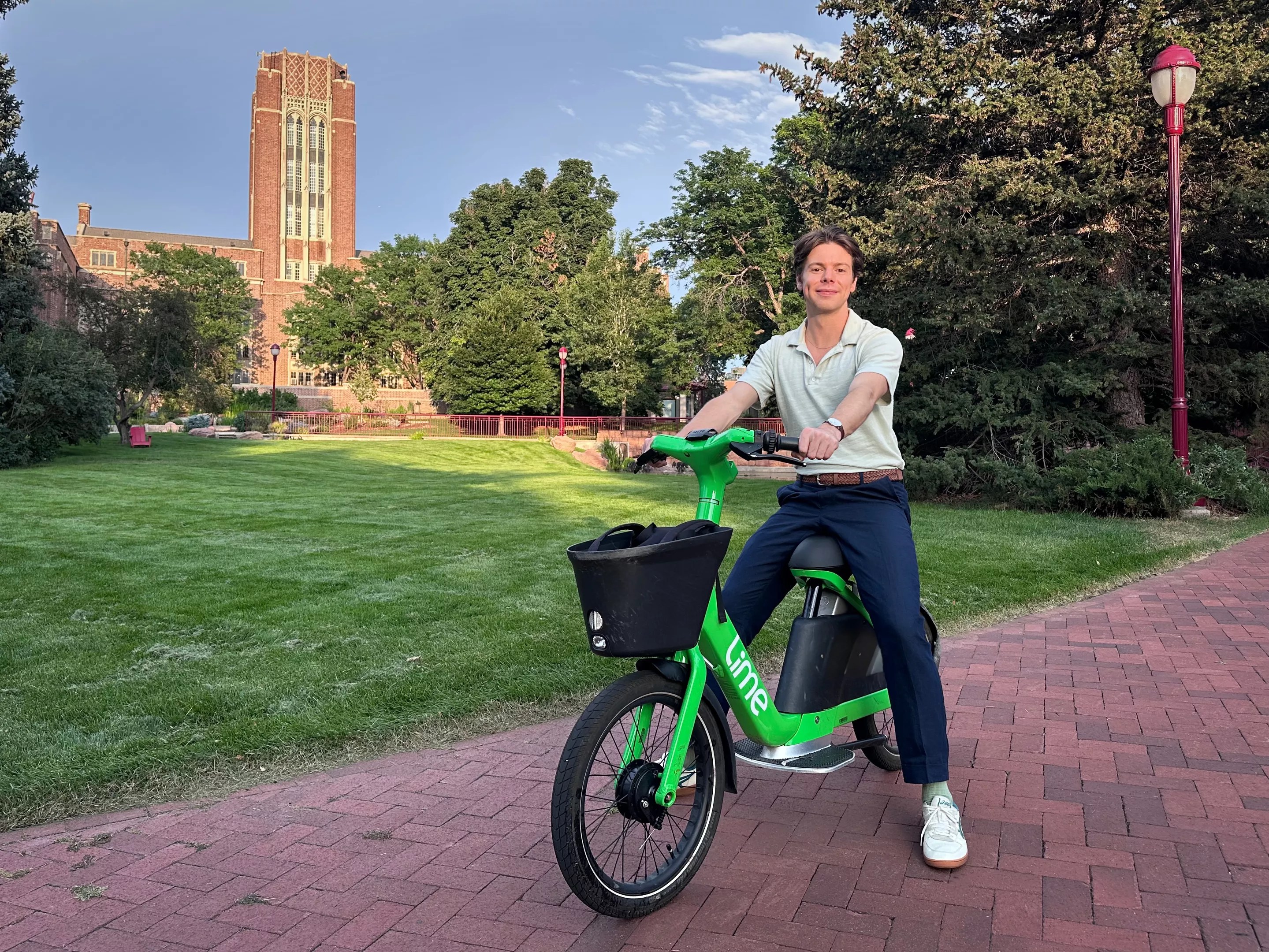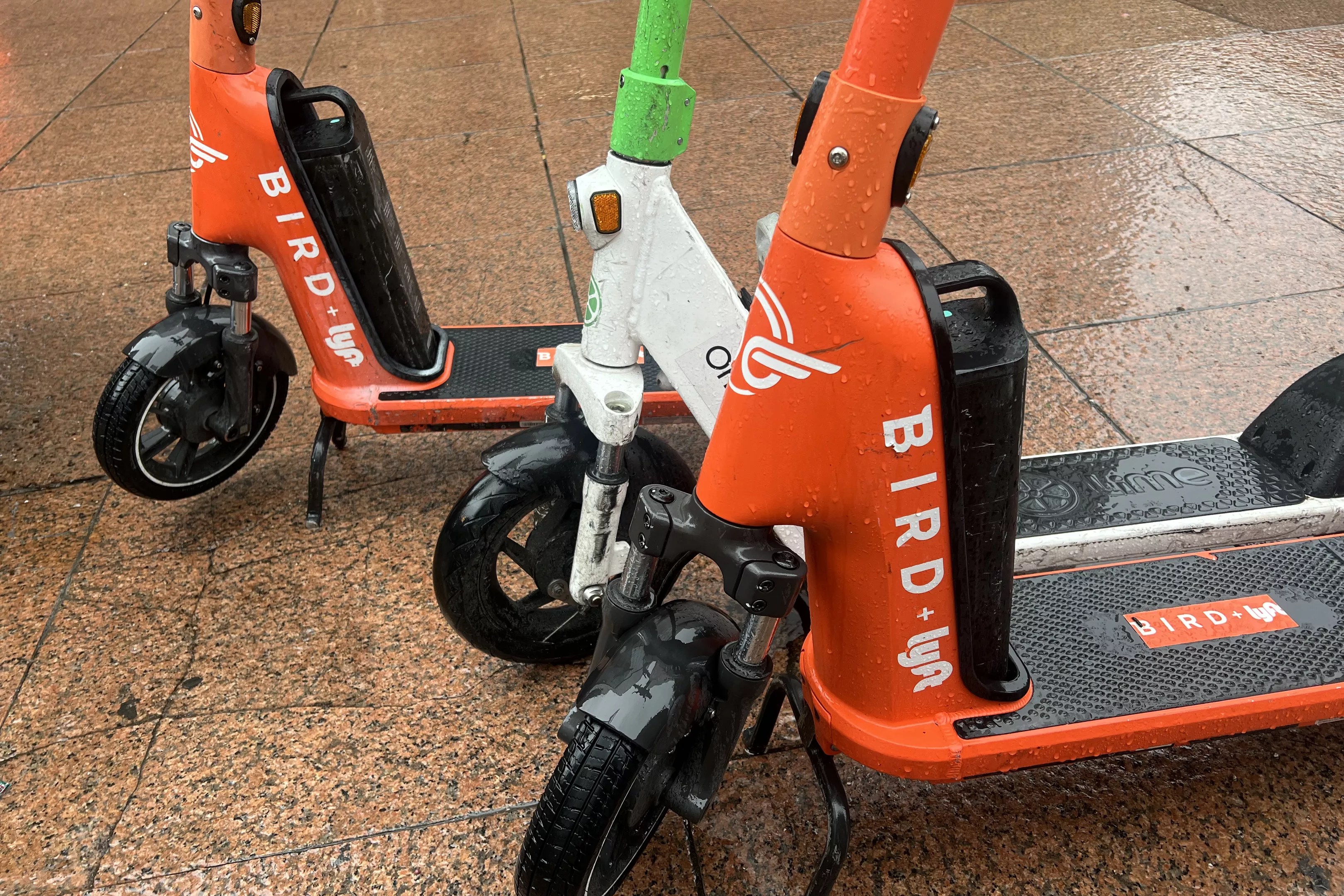
Courtesy Joel Cox

Audio By Carbonatix
Are electric scooters the key to getting Denver residents to use public transit? The Regional Transportation District wants to find out.
RTD is funding a two-year pilot program to provide free e-scooter and bike rides to two Denver transit stations beginning in early 2026. The “First Mile Free” program is expected to subsidize around 40,000 trips, paying for the first mile of rides that end at the University of Denver and Decatur-Federal stations.
The idea originated from a school assignment to create a policy to improve Denver’s transportation system, says Joel Cox, a University of Denver graduate student studying environmental policy.
“I started by thinking about my own day-to-day experience,” Cox says. “I live about a mile from the University of Denver station, and I’d love to use it more often. But most days, it’s just too far of a walk. Driving and parking there kind of defeats the point. I could call an Uber, but once you add that cost onto the fare, it stops making sense. The more I looked into it, the more I realized I’m not alone in that.”
Only 25 percent of Denver residents live within a short walk of all-day frequent transit, according to a city report from 2019. This is known as the first and last mile problem: How to connect riders to a transit station from their starting location or final destination.
Rentable e-scooters and bikes are the cheapest and most efficient way for travelers to cover that distance, Cox argues. Because the infrastructure is privately owned and already in place, he estimates it will cost RTD approximately $4 per person to get to a transit station via scooters and bikes, compared to hundreds of dollars per person to run a shuttle service or other alternative.
RTD awarded the First Mile Free program $122,554 on Tuesday, August 5, to be spread out over two years. The money will go to the West Corridor Transportation Management Association, which will run the pilot after partnering with Cox to apply for the grant.
Lime and Bird will contribute an additional $24,510 to the program, as well as provide a 25 percent discount on rides that are part of the pilot, an estimated value of over $40,000. The two micromobility companies are the only ones currently licensed to rent out e-scooters and bikes in Denver.
“We view this pilot as a vital opportunity to demonstrate how micromobility can amplify the reach and effectiveness of existing public transit systems,” wrote Zach Williams, Lime’s senior director of government relations, in a letter of support for the program. “First Mile Free offers a replicable blueprint for cities across the country.”
The program was also backed by letters of support from Denver City councilmembers Sarah Parady, Paul Kashmann and Jamie Torres.
“I look forward to seeing how successful and scalable this program proves to be,” Parady says in a statement. “With budget crises bearing down on state and local governments and our transportation emissions proving difficult to abate, the need for cost-effective, equitable transportation programs that promote mode shift and improve last-mile connectivity cannot be overstated.”
How the Free Rides Work
The program is expected to launch in the winter, lasting from early 2026 into 2027, until funding runs out.
Denver residents will not need to take any action to benefit from the program. Users can simply rent an e-scooter or bike from Lime or Bird as usual, and if their trip ends at the University of Denver Station or the Decatur-Federal Station, then the first mile will automatically be free. The Lime and Bird apps will use geofencing technology to determine a trip’s end location.
If a trip is longer than one mile, the program will provide the first mile for free, then the user will be charged the rest of the cost as normal. If a trip is shorter than one mile, then it is fully covered.
The program only applies to trips that conclude at the two stations, not trips that start at the two stations. Cox says that decision was based on funding constraints and logistical challenges, such as the possibility of users being unable to find a scooter or bike parked within the geofenced program range to start their ride.
While the pilot program is limited to the University of Denver and Decatur-Federal stations, Cox says he hopes to one day expand to the entire city. The program will measure whether public transit use increases at the two stations during the pilot, in addition to issuing surveys to users via the Lime and Bird apps to collect feedback on how the program impacts users’ transportation choices.

E-scooters line a sidewalk in the Central Business District neighborhood in downtown Denver.
Hannah Metzger
“Pending First Mile Free’s success in this initial pilot program, I’ll hope to reapply for this grant next year at a larger scale, or maybe look at other grants or other funding sources,” Cox says. “Whatever’s available, I’m going to fight to secure.”
He says the two pilot stations were chosen because they are multi-modal transit hubs that are both experiencing strong dips in ridership despite serving populations of drastically different incomes, demographics and vehicle access rates.
“That’s important for a pilot program. You need a large testing pool that includes people of different backgrounds to be able to have a comprehensive data set,” he adds. “Because at the end of the day, the next goal is to scale this citywide.”
This comes as tensions regarding e-scooter use in Denver have come to a head. While the devices are wildly popular – 2.3 million e-scooter trips have been recorded in the city so far this year – they’ve attracted countless complaints for impacts ranging from blocked sidewalks to dangerous rider behavior. Denver Health registered 1,962 patient visits attributed to scooter injuries in 2024, more than five per day.
The Denver City Council passed stricter rules for e-scooters and bikes in May, which will soon require the vehicles be fitted with technology that detects when users ride on sidewalks, in addition to other changes like mandatory parking zones. But councilmembers aren’t writing off the scooters completely; Councilwoman Parady both sponsored the stricter regulations bill and signed on in support of the First Mile Free pilot program.
After Cox created First Mile Free as a school assignment in March 2024, he says he started going to city meetings to stop councilmembers in the hallway and pitch them his idea, but it wasn’t an effective strategy. He eventually turned to presenting the program to local nonprofits, which is how he connected to the West Corridor Transportation Management Association.
He says it feels “surreal” that the program is finally coming to fruition, and this is only the beginning.
“I’m going to do everything I can to push this as far as I can,” Cox says. “I want to keep pushing for policies that make people’s lives better because this city has given me a lot. Far more than I can sum up.”